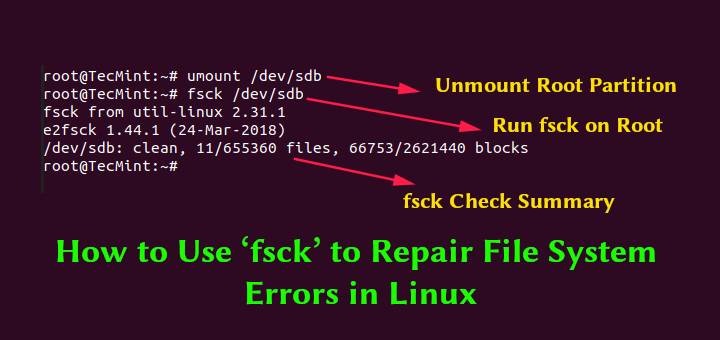You should try these recovery methods when you get a root file system error code.
Approved: Fortect
Thus, to force a root filesystem check, it is easy to restart the system and start the filesystem with fsck if a particular type of system is started before the root filesystem is mounted by that kernel. To force fsck to reload, first create an empty track named forcefsck in / as described below.

How do I check my filesystem?
Click the “Start” button and, if necessary (depending on your operating system), click “Computer” or “My Computer”. In some windows on your computer, right-click the drive you want to check and, if necessary, select Properties from the menu. In the Disk Properties window, the information is listed next to the Computer file field.
What To Do Check The Root (/), /usr Or Possibly /var Filesystem From An AlternativeBoot Device
For new and innovative information about fsck, seeSolaris Express Version,see Extensions to the UFS File System Utilities (fsck, mkfs, and newfs). Of course, there is no need to re-run fsck ifYou will see the full message:
File At System Check Interval
Well, that was unexpected. I thought we took care of it, but luckily it’s very easy to implement. Note that the number used only as a default argument is days. So wear 1s (1 second) instead of 1 day (86400 seconds):
Where is file system root?
The / home filesystem contains user files and directories. On the corresponding stand-alone machine, the / home directory is literally contained in a separate filesystem, the root of which is mounted above the root filesystem of the / home directory.
Force The Current Check
If you are using the mkinitcpio base country, you can force fsck on boot, by passing fsck.mode=force as a kernel parameter. This will scan all the files you process on the computer.
Approved: Fortect
Fortect is the world's most popular and effective PC repair tool. It is trusted by millions of people to keep their systems running fast, smooth, and error-free. With its simple user interface and powerful scanning engine, Fortect quickly finds and fixes a broad range of Windows problems - from system instability and security issues to memory management and performance bottlenecks.

Enforcing FSCK Filesystem Checks In Ubuntu
This article aims to provide our company with guidance on how to force fsck to perform consistent filesystem checks in upcoming/planned multi-stages reboots in Ubuntu. . The mount point for many of these system reboots may or may not be root.
How do I find my root partition?
fdisk get – manipulate the hard disk partition table.The sfdisk operator is a Linux partition table manipulator.Lsblk command – list block devices.
Is It Possible To Run Fsck On A Mounted File System?
Only start Windows with a running file system and/or a mounted operating system system. fscks works and is sure to repair Linux filesystems sometimes depending on your OS type. Your DVD or/or data can be dangerous if you run fsck on a fully mounted filesystem.
How do I force a root filesystem check in Linux?
To force a root filesystem check is probably one of the easiest ways to restart the system and force fsck to start the filesystem every time you boot the system, before the root filesystem is started close to the kernel. To normally run fsck on restart, first create an unnecessary file called forcefsck in / like nshown below.
How Do You Run Fsck On A Mounted Filesystem?
To be sure, don’t try running fsck on sensitive mounted filesystem, add the -M option. This flag tells the fsck tool to move mounted filesystems. To show you the current difference, let’s run fsck on sdb while it’s mounted, and then every time we unmount it. As long as the sdb is attached to the wall, the tool exits the tool without performing a test.

How do I force a fsck check on a root partition?
The easiest way to force a fsck file system check on the base partition is eg. / dev / sda1 should create some kind of empty file called forcefsck in the root of the partition. This empty file temporarily overrides all other options and forces fsck to check this filesystem on the next multi-level reboot.


